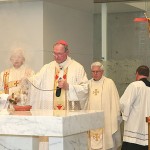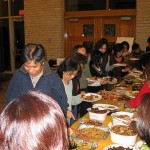We have a tradition in our Passionist Community, as do other religious communities, of celebrating the anniversary of a member’s religious profession. One of our Brothers was celebrating the 50th anniversary of his religious profession and during the Mass the rector of the house preached a homily, congratulated him and presented him with a Papal Blessing. He then made a very strange statement. He said, ‘I really can’t see why we congratulate and thank people for doing what they vowed they would do.’ These words really shocked me.
I’m reminded of that homily every time I hear today’s gospel and Jesus ‘words, we are worthless slaves, we have done only what we have ought to have done.
I read somewhere that in the ancient Middle-Eastern world every family, even relatively poor ones, had at least one unpaid servant. The very poorest families gave some of their children to other families as servants to ensure that they would be fed.
The master in this parable apparently had only one servant who both tended the fields and did the cooking. The thrust of the story is clear and straightforward. Good servants do what they are told. A master never has to thank a servant for doing what is expected.
As Christian men and women we were invited into a personal relationship with God through Jesus Christ. St. Paul tells us ‘God chose in Christ before the world began to be God’s adopted sons and daughters.’ God choose us we did not choose God. The health and the depth of our relationship with Christ depends upon how we listen to Christ’s words and follow his teachings. Remember the old question,’ if you were arrested for being a Christian would there be enough evidence to convict you? Do we love others as Christ loves us? Do we forgive others as Christ forgives us? Are we there for those in need, not just of their physical needs but their spiritual needs as well? Do we offer comfort, companionship, understanding or emotional support? As often as we do these things for others we do them for Christ. This is our identity as Christian men and women.
Remember the story of the scorpion and the frog? The scorpion wanted to cross a river but had no means to do so. He spotted a frog on the other side and asked for help. The frog didn’t trust the scorpion knowing he had a sting that kills. Eventually the scorpion talks the frog into carrying him across the river with the promise he would not sting him. When they get close to the other side the scorpion stings the frog. When the frog protests this betrayal the scorpion answers, I just couldn’t help myself, it’s my nature to sting.’
The point of the parable is that just as a household slave is not an employee of his master and never earns anything when he carries out his duties—so we, when we have lived out our lives as disciples and followers of Christ, loving, forgiving, serving, being there for others, this does not establish a claim for a reward. The scorpion stung the frog because that’s what scorpions do – We Christians love and serve and forgive because that’s what Christians do. For all that, we trust Christ’s promise; our reward will be great in heaven.
 Founded by St. Paul of the Cross, every Passionist takes a special vow to spend his or her energies in promoting remembrance of the sufferings of Jesus, the memory of the Cross, and reflection of the meaning of the Cross for the world.
Founded by St. Paul of the Cross, every Passionist takes a special vow to spend his or her energies in promoting remembrance of the sufferings of Jesus, the memory of the Cross, and reflection of the meaning of the Cross for the world.




